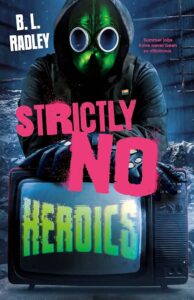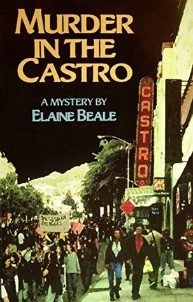Strictly No Heroics is a YA urban fantasy novel that treats “super” as an adverb as much as a noun. It introduces a world of supers—superheroes, supervillains—who are super dangerous to normies (non-powered humans) and super helpful to the forces of gentrification. Main character Riley has simple desires: earn enough money for therapy, look out for her little sister. A normie from a normie family, she finds herself drawn into conflicts both super and ordinary when she joins Hench, the supervillain equivalent of TaskRabbit.
The queer content is great. Being queer is normal—sometimes wonderful, sometimes stressful, but never tragic. Riley deals with crushes and worries about coming out, though she knows and understands her own identity already. It’s not news to her that she’s queer—but it might be news to her friends and family. A secondary character is an older man whose husband somehow puts up with him. Their situation is unexpectedly sweet and domestic for a team leader of Henchfolk: they’re married, they banter, their twins frequently remind them about the swear jar.
This is a working person’s superhero world. This novel offers strong “average working day” vibes in a non-average setting. Look, supervillains are busy people. Who do you think picks up their coffee and cleans their labs? That’s right: the underpaid worker drones at Hench. Sometimes, work is boring and unfulfilling. It also offers extreme workdays—because sometimes you’re cleaning a villain’s lab and other times you’re helping construct his laser! This is where it gets really interesting to me. The Henchfolk are not actually evil. Some of this is explored jokingly, as when Riley is trained in anti-marksmanship, but some serves as a very clear parallel for weaponized incompetence, such as when they “can’t find” the deadly laser’s instruction manual. Finally, it introduces the real solution when Riley finds herself flirting with unionization—quite literally, as the lead organizer becomes a secondary love interest!
This is also a story about quiet, everyday love. Sometimes that love is romantic, like the feelings brewing between Riley and Sherman, her spiky, motorcycle-riding, union-touting teammate. Other times, it’s familial. That can be simple, like the love between Riley and her annoying little sister Lyssa; it can be complicated, like the love between Riley and her guardian, Lyssa’s bio-dad, Hernando. As a reader, I found it clear from the start how much Hernando loved Riley, but understood her feelings of uncertainty due to a complicated relationship with her deceased mother.
Finally, this book has excellent disability representation. Both Riley and Lyssa were left disabled by the car crash that killed their mother. Riley has PTSD and Lyssa has a prosthetic leg. It’s not uncommon for superpowered stories to treat disability as a metaphor or trait to be overcome with those powers, and I appreciated a book that wasn’t like that at all.
Strictly No Heroics is about power, family, and the inconvenience of falling in love. It’s about the devastation Superman leaves behind, the lives ruined in his wake, and the gentrifiers who see opportunities. And it’s about being a snarky, genre-wise teenager with very unfortunate crushes.
Content warnings: significant inclusion of PTSD, panic attacks; tangential inclusion of sexual assault, racism

